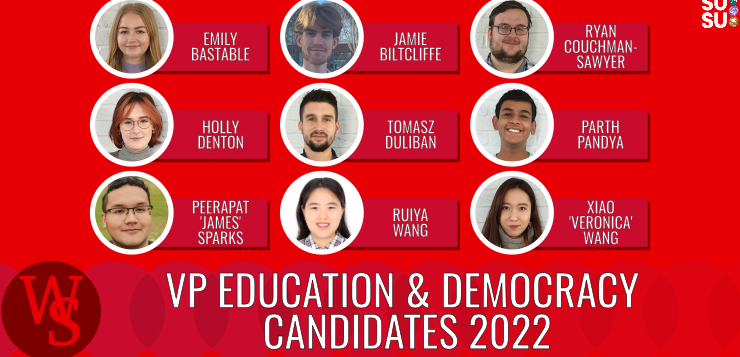- Interview with Zoe Chapple: VP Activities Candidate
- Interview with Rishi-Nayan Varodaria: Union President Candidate
- Interview with Parth Pandya: VP Education and Democracy Candidate
- Interview with Samuel Pegg: VP Activities Candidate
- Interview with Oliver Murray: Union President Candidate
- Interview with Xiao ‘Veronica’ Wang: VP Education and Democracy Candidate
- Interview with Benedict Madan: Union President Candidate
- RUMOUR HAS IT… 2022 UNION ELECTIONS RUMOURED SABBATICAL OFFICER CANDIDATES
- Interview with Jamie Biltcliffe: VP Education and Democracy Candidate
- Interview with Holly Denton: VP Education and Democracy Candidate
- Interview with Emily Bastable: VP Education and Democracy Candidate
- Spring Elections 2022 Candidates Revealed
- There’s still time to nominate yourself for a SUSU leadership role
- Interview with Harry Bull: Union President Candidate
- Interview with Ryan Couchman-Sawyer: VP Education and Democracy Candidate
- Interview with Selin Moustafa: VP Welfare and Community Candidate
- Interview with Ruby Turner: VP Welfare and Community Candidate
- Interview with Aycha Ates-Di Adamo: VP Welfare and Community Candidate
- Interview with VP Sports Candidate: Casie Osbourne
- Interview with Corin Holloway: VP Activities Candidate
- SUSU Spring Elections 2022 Liveblog
Wessex Scene were able to interview Parth Pandya about their campaign to be the next VP Education and Democracy.
Parth elected to answer these questions during an interview.
Why did you apply for the role of VP Education and Democracy?
I have four years of academic rep experience, strong academic connections which means I’ll be able to fight for realistic as well as idealistic change.
In your manifesto, you mention that accountability is ‘cliche’. Why do you think this?
I think, mainly, accountability is something that is important. We can get accountability. However, I find that it is a vague term and I feel like a lot of people running just say the word ‘accountability’ as a buzzword. I think it is important to be specific about lobbying and it is important to be very clear about what you are doing, if that’s running petitions or ‘You Make Change’ or the all-student votes. I think that’s why people are really disillusioned with SUSU because people aren’t saying anything specific and are just saying slogans. I think VP Education and Democracy candidates, in particular, need to do better than just saying, ‘accountability’ or ‘making your voice heard’. I think that’s really, really important.
Why do you think postgraduate and joint honours students need to be a higher priority than they currently are?
I think this is really important because a lot of undergraduates get a lot of support. I think the university offers them a lot of support for profit incentives, and things like that. However, the thing with Joint Honours and Postgraduates, is they come under specific bureaucratic standards where a lot of the time there are lack of alignments.
A lot of the Joint Honours students that I’ve spoken to when I’ve been a rep, sit in two faculties or two Schools and they never really get any support. Their Personal Academic Tutors never really know what they want or what they need, or specifically know how to deal with them. I think they’re very overlooked when they have a lot of specific needs that need to be cared for.
With Postgraduate students, I think SUSU doesn’t do enough because I don’t think it really knows what it wants to do. I think Postgraduates are now part of the SUSU strategy which is really good, but I think they deserve a little bit more support because they are often overlooked. For example, with timetable clashes, they never really get Wednesday afternoons off and that’s not great. I think a lot of representation is not really well known to them because most of them are international students so I think more can be done about advertising and making sure that they know what feedback from students is available to them. Also, reaching out to research students who are just isolated from the academic community in general because they just do their own thing. It’d be about reaching out to them as well.
What improvements would you make to PAT tutor responsibilities?
A lot of Schools and a lot of faculties are very different and I think it’s really important for people who vote in these elections to know that. For example, in my School, PAT responsibilities are really good. It’s solid, PATs are supposed to reach out and they know what they’re doing and they know what support they are offering. But, a lot of other faculties, a lot of other Schools don’t have the same support. STEM especially, this is a really big issue, where a lot of PAT groups are very large groups sometimes. Also you have some PATs who don’t reach out to some of their students. I think it’s really important for PATs to get handbooks to know what their responsibilities are, but also that they get support themselves. So the student comes up to them and they need Pastoral support, a lot of PATs have to go rushing around trying to find the answer. Often, they direct people to the wrong place, especially for international students. I would like more guidelines on what they can do. I think there’s more stuff we can do. The university loves to streamline and integrate things, so I think the university would find it palatable if we integrated some mental health support or skills into what PATs can do. I think there is another section on my manifesto about Employability Coordinators, which is linked to what PATs do. They’re taken for granted by university staff and I think it’s quite a dead role, there’s more we can do there with supporting them to have better employability sessions.
What is curriculum decolonisation, and what are your ideas or plans for it?
I think the most important thing to say from the outset is that curriculum decolonisation is not something that a VP Education and Democracy can do in their first year. I feel like a lot of people who are putting curriculum decolonisation on their manifestos, especially outside of VP Education and Democracy, need to realise this is a long-term thing and maybe isn’t something that is palatable to a lot of lecturers and university executive staff. I think this is where I come in specifically because I think the way I’m going to approach curriculum decolonisation, which is basically what I think is important about it, is not just that I feel as though the inclusion of different sorts of voices or opinions or things like that, I think it’s really important and not that difficult, especially for Humanities subjects, to check ethnic centricity, which is essentially not taking a Western perspective on a lot of issues. I think that really can be helped by offering other journal articles to read by other authors who may have lived experience of those things. Secondly, checking their slides to make sure that case studies are up to date or that there’s a wide range of those things. I think as academics that’s good because academic staff particularly know a lot about their subjects, so I think that inclusion is fine. But, it’s got to be a long-term plan specifically because this takes a lot of time. Courses and modules revalidate every couple of years so you can’t just implement it in a year and do lots of things on it. I think it’s really important to get the plan right. That’s the best way to achieve things.
What projects would you continue from the current VP Education and Democracy?
I think the main couple of things that I would like to continue is, first of all I think Lottie (Current VP Education and Democracy) is doing good work on Personal Academic Tutors and getting that out there which is really important, but I think I would also carry on with what I am planning on doing which is creating frameworks of making PATs know and ensuring they meet with their tutees.
Second of all, the accessibility stuff that Lottie is doing is very important, specifically around recordings and lectures. But also accessibility to voting and democratic parts of things. But I think my main thing is that we need to be more specific, more grounded and a bit more realistic about what we’re doing as VP Education and Democracy because, talking to reps and talking to SUSU staff, I feel as though being too idealistic makes people turn their heads, so I think that is also what I would change about the current approach.
Wessex Scene attempted to contact Peerapat ‘James’ Sparks, Ruiya Wang, or Tomasz Duliban but unfortunately were not able to set up an interview.




